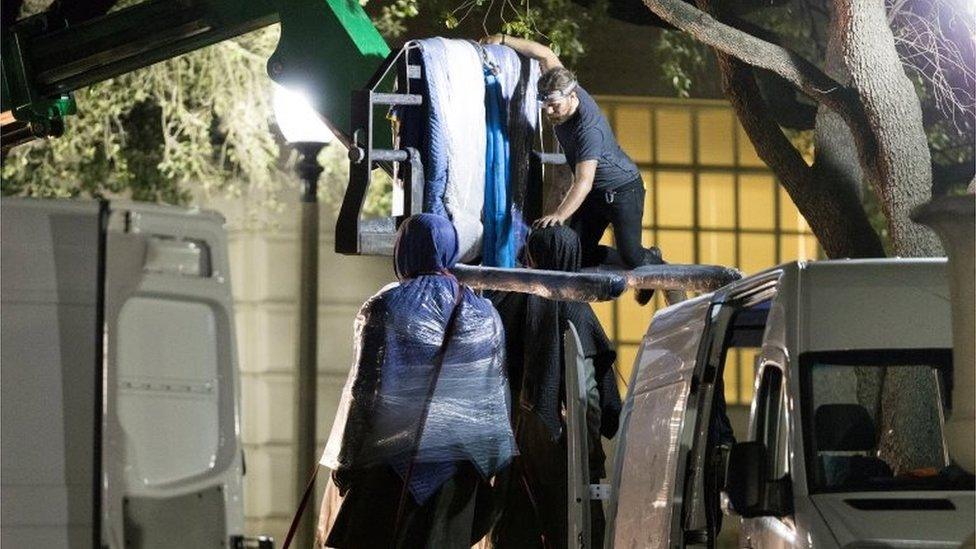University of Texas removes four Confederate statues
- Published

Monuments to Confederate figures are symbols of "modern white supremacy and neo-Nazism", the college said
The University of Texas has removed four Confederate monuments overnight in the wake of violent clashes in Virginia earlier this month.
A statue of General Robert E Lee was among those taken down from the Austin campus early on Monday.
Monuments to Confederate figures are symbols of "modern white supremacy and neo-Nazism", the college said.
A woman's death at a far-right rally in Charlottesville has reignited debate over America's racial legacy.
"Last week, the horrific displays of hatred at the University of Virginia and in Charlottesville shocked and saddened the nation," University of Texas at Austin President Greg Fenves said on Sunday.
"These events make it clear, now more than ever, that Confederate monuments have become symbols of modern white supremacy and neo-Nazism."
As well as Lee, who was military commander during the 1861-65 American Civil War, a statue of another rebel general, Albert Sidney Johnston, and of Confederate postmaster John H Reagan were taken down.
What do Germans think of Charlottesville?
They were moved to a centre for American history on campus.
A statue of Texas Governor James Stephen Hogg, who served from 1891-95, was also removed and will be considered for re-installation at another site.
"The University of Texas at Austin has a duty to preserve and study history," Mr Fenves continued.
"But our duty also compels us to acknowledge that those parts of our history that run counter to the university's core values, the values of our state and the enduring values of our nation do not belong on pedestals in the heart of the Forty Acres."
The university removed a statue of Confederate President Jefferson Davis from its campus in 2015 following a mass shooting at a church in Charleston, South Carolina.
Mr Fenves added that he spoke with members of faculty, students and alumni following the deadly demonstrations in Virginia.
Dozens of schools and local governments have begun removing statues dedicated to the Confederacy, which was a pro-slavery rebellion against the federal government.
It follows violent clashes at a march on 12 August in Charlottesville, Virginia, where white supremacists and neo-Nazis protested against the removal of a monument of General Lee.
A 32-year-old woman was killed and nearly 20 people injured when a car was driven into a crowd of counter-protesters.
Last week, four Confederate-era statues were taken down in Baltimore, Maryland, while the governors of Virginia and North Carolina have ordered the removal of similar monuments in their states.
Recent removals of Confederate statues has sparked backlash among an outspoken group of Americans who view the statues as symbols of US history and southern culture.
President Donald Trump weighed in on the debate on Thursday, tweeting that controversial monuments are "beautiful", adding that they would be "greatly missed" from US cities.
But opponents argue the monuments serve as an offensive reminder of America's history of slavery and racial oppression.
"The historical and cultural significance of the Confederate statues on our campus - and the connections that individuals have with them - are severely compromised by what they symbolise," Mr Fenves said.
"Erected during the period of Jim Crow laws and segregation, the statues represent the subjugation of African Americans. That remains true today for white supremacists who use them to symbolise hatred and bigotry.